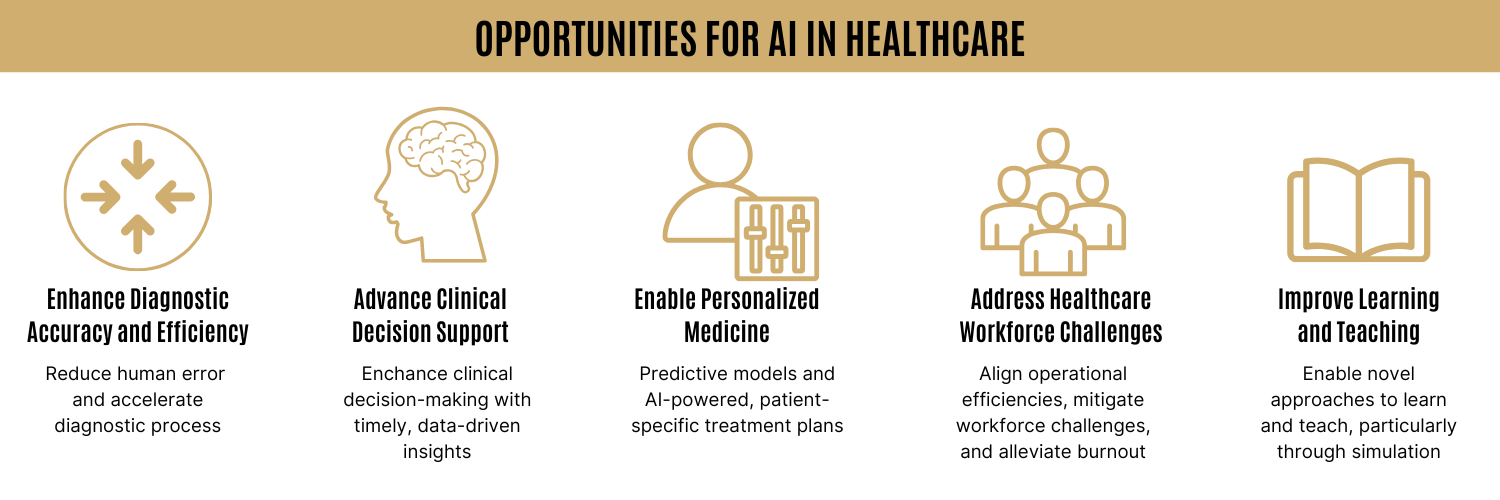Foundations of Physician Responsibility – Health Informatics and Artificial Intelligence

The Future of Medicine: Where Data, Technology, and Care Converge
Modern medicine is powered by data and technology, and at the heart of this transformation is Biomedical and Health Informatics. As a physician, you won’t just be delivering care—you’ll also integrate information systems, data-driven insights, and artificial intelligence (AI) to enhance patient outcomes. At Vanderbilt, we prepare you to practice and lead in a system of healthcare where informatics is a fundamental part of the present and future of clinical practice. ain.
What is Informatics?
Informatics is best characterized as the intersection of people, processes or systems and, of course, technology and data science. Biomedical and health informatics specifically is impacted by the science of health and biology as well as organizational behavior, communication, and relationships (Hersh, 2009). In other words, every physician is, in part, an informatician—relying on data and technology to make informed decisions as part of a team or organization within a complex healthcare system.
Why learn about AI in medical school?
AI is transforming every corner of healthcare, making it essential for future physicians to understand and embrace these tools. With the rapid pace of advancements, you will need more than just a passing familiarity with AI—you will need to understand how these tools can augment your expertise, improve efficiency, and uncover new insights from complex data, all while preventing perpetuation of bias. Regardless of your chosen specialty or career path, you will encounter AI-driven solutions—from automating routine administrative tasks to identifying subtle patterns that enhance personalized care. By gaining this knowledge early, you will build a foundation of adaptability, enabling you to embrace future innovations and deliver the highest standard of care in a world where technology and medicine are increasingly entangled.
Informatics/AI Curriculum in FPR
Training in informatics and AI is deeply integrated across your entire medical school experience, anchored in the Foundations of Physician Responsibility (FPR) curriculum and extending throughout your education. You will develop core informatics competency across the levels of Self, Patient, Team, and Systems, gaining hands-on experience that prepares you for the real-world use of BMHI. During your time at VUSM, you will learn to…
- Practice in Harmony with Health IT – Health Information Technology (Health IT) is the backbone of modern clinical practice. From EHRs to patient portals, these systems streamline care but can also contribute to physician administrative burden and burnout. In this curriculum, you’ll learn to navigate Health IT with skill—using technology to improve patient care, collaborate with teams, and engage with healthcare systems, all while maintaining a balanced, adaptable relationship with the tools you use.
- Engage with the Learning Health System – Healthcare is increasingly driven by vast amounts of real-world data. Data from EHRs, remote patient monitoring, imaging systems, genomic analysis, and more, power the learning health system—a continuous, data-driven loop where patient care is constantly improved through evidence generation. At Vanderbilt, you’ll learn to engage with this system, leveraging data to personalize care, fill gaps in medical evidence, and contribute to system-level improvements.
- Collaborate with AI – Artificial intelligence (AI) is transforming the future of medicine, offering new ways to enhance learning, improve decision-making and streamline workflows. In this curriculum, you’ll learn about the diverse opportunities for AI in healthcare (examples below) and how to integrate it thoughtfully into your practice—not to replace human judgment, but to amplify it. You’ll explore how collaborating with AI can lead to better patient care, reinforcing the idea that the most powerful medicine combines the strengths of both human and machine.
Beyond FPR – Unparalleled BMHI Expertise
Want to take your BMHI training further? Outside of FPR, you’ll have opportunities to dive deeper into clinical informatics, whether through immersive electives or cutting-edge research with the VUMC Department of Biomedical Informatics, the largest BMHI department in the world. Whether you aspire to specialize in clinical informatics or advance the science of BMHI through data and AI, Vanderbilt offers you the tools and mentorship to explore these fields in depth.
Biomedical Informatics Faculty

Julian Genkins, MD
Assistant Professor of Medicine
Assistant Professor of Biomedical Informatics
For more information on Biomedical and Health Informatics in FPR and at VUSM, please email us at fpr@vanderbilt.edu.

